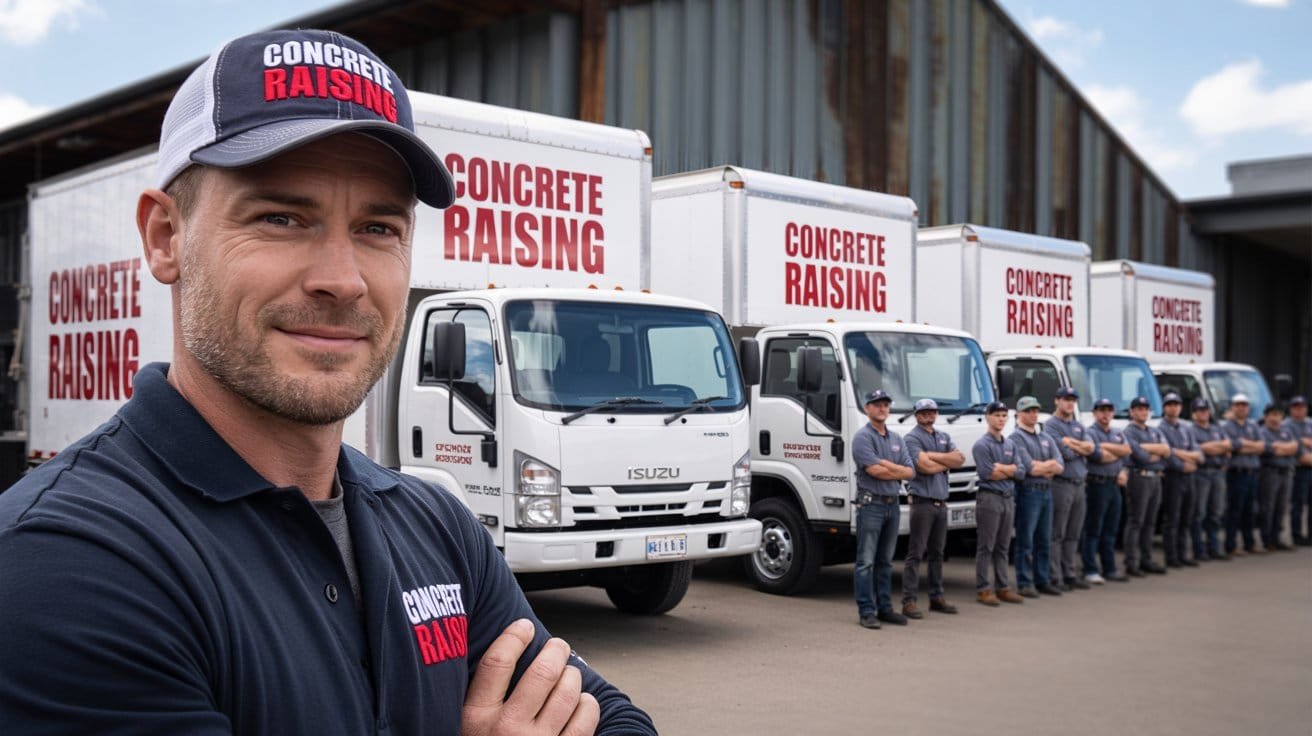From One-Person Operation to Industry Leader
Starting your own business is not an effortless endeavor. For those who think it will be “easier than working for someone else,” you’re in for a rude awakening. The truth is, owning a business requires more than just hard work; it takes resilience, adaptability, and a long-term vision. However, the goal of transforming from “being the business” to running your business is an achievable one. This fact, however, was not obvious to me when my wife Trish (and business partner) and I started our concrete raising business. At that time, I wasn’t even sure we could get enough work to keep myself employed! Nonetheless, I quit my job of 24 years, and we invested in equipment to provide a service I had never done. I was willing to take the risk and had my wife’s support, but I was admittedly unsure of how it was going to play out for us.
Perseverance—and a lot of help from Trish—saved me in those early days. There were moments when it felt overwhelming, but I reminded myself that the hard work would eventually pay off. Trish jumped in with both feet and created a top-notch customer service system that made all the difference. You know it’s true: first impressions are everything, and she knocked that out of the park. With her professionalism, we quickly gained customer confidence. Take it from me: starting and building a successful concrete-raising business can be more than one person can handle, so be willing and ready to ask for some help.
The good news is, if I can do it, you can do it! Remember, the benefits of scaling your business will be well worth the dedication and effort you’re putting in today.
Before we dive deeper, let’s consider this roadmap—in no particular order:
Adopt the mindset of a scaled business now
Develop a skilled and professional workforce
Maintain a reliable fleet of equipment
Build a strong reputation and industry relationships
Create a brand and earn industry leadership
Ensure consistent service quality as you grow
By aligning your actions with these goals, you’ll be better positioned to scale effectively when the time comes. Let’s dive into each of these key areas.
Think Like the Business You Want to Become
Work on adopting the mindset of a scaled business now.
I know it might feel like pretending to be something you are not. Trust me, that’s not what this is. This is about setting the foundation for growth by thinking like the business you aspire to become. By aligning your current thinking and actions with your future goals, you’ll be better positioned to scale effectively.
That doesn’t mean spending like a large company—it means leading with the same discipline, organization, and professionalism you’ll need when your business grows. Start that mindset today, and watch the impact it has on your business tomorrow.
Build a Team That Drives Your Business Forward
A well-trained team will be the backbone of your scaled concrete-raising business. Technicians must be highly skilled in the intricate art of concrete raising, which can only be mastered through time and hands-on experience. In addition to technical knowledge, employees need training in customer service to handle the wide range of personalities they’ll encounter—from pushy clients to those with unrealistic expectations.
The truth is, you’re unlikely to find fully qualified technicians ready to hire—you’ll probably have to create them. Look for energetic, mechanically inclined people with a desire to grow and take on responsibility. These are often individuals who want a solid career without the need for college. Hiring is another area where my wife excelled—she’s just good at reading people! Trish knew all the hard questions to ask applicants and did a great job filtering out those who didn’t have what it takes. You have to be very selective when hiring, because the job will demand a lot from anyone you bring on board.
You can offer applicants a “degree in the art of raising concrete.”
We’ve found the safest, most productive crew setup is a “crew leader” and an “apprentice.” Ideally, the apprentice should want the opportunity to become a crew leader someday. Not everyone will, but encouraging that mindset ensures you’re always developing your next leaders. Building professionals takes time and money—you can’t afford to invest in people who aren’t clearly driven to grow with the company.
I once thought formal company policies were just for bigger companies. I couldn’t have been more wrong. This is an area where thinking like a scaled company today pays off big later. Write or have someone help you develop company policies that all employees sign off on. Poly Service Pros coaching services can help in this area. Even if you’re starting with just one or two employees, setting expectations now will save headaches as you grow. It’s much easier to teach good habits early than to fix bad ones later.
Getting employees used to policies now is easier than changing bad habits later.
To help facilitate workforce growth, develop a comprehensive field operations program that outlines every step of day-to-day work. This should include safety precautions, concrete raising techniques, equipment operation and maintenance, and customer relations. Also include clear direction for crew leaders to train and mentor their apprentices. Implementing a structured operations plan adds guardrails to how your business functions and accelerates growth by requiring new technicians to learn from seasoned professionals.
Keep Your Equipment in Top Shape for Uninterrupted Growth
Reliable equipment is essential to a successful concrete-lifting company. Without dependable machinery, even the best technicians can’t perform their jobs effectively. No amount of advertising or scheduling will save you if your equipment consistently breaks down.
Implement a detailed maintenance schedule to avoid costly downtime. Make it visual—post large, easy-to-read charts in common areas or use digital tools to track service intervals. Encourage employees to provide feedback about the machinery, including suggestions for spare parts or maintenance improvements. For accountability, we added a column to every crew leader’s timesheet confirming that maintenance items are up to date daily.
Stay ahead with proactive maintenance—it’s easier to prevent than to repair.
As the business owner, make sure you or a manager regularly visit job sites and inspect the equipment. Listen for abnormal sounds, check for excessive heat, and ensure ventilation systems are functioning properly. A hands-on approach prevents small issues from turning into expensive problems.
It’s not a matter of if equipment will fail—it’s simply a matter of when.
For newer companies, it might not be practical to stock spares of everything. However, it’s wise to keep smaller, high-wear items on hand. For concrete raising companies, these might include a transfer pump, reactor pump rebuild kits, an injection gun, air compressor belts, strainer screens, or a compressor pump assembly. Having these parts in stock can save you days of downtime and unnecessary costs.
When building your fleet, keep spare parts in mind. To the extent possible, purchase identical components to reduce the variety of spares required. This also simplifies training and maintenance for your crews.
Build a Strong Reputation and Industry Relationships
A strong reputation is vital for attracting clients. Like most worthwhile things, it doesn’t come easy—it must be cultivated. A solid reputation opens doors to commercial and municipal clients, helping you maintain consistent work even during economic downturns.
Accept the fact that in-person networking is an incredibly powerful tool. Identify key players in your market and find ways to meet and interact with them. Develop ways to differentiate yourself from competitors. Join relevant organizations, attend trade shows, or connect with peers online if in-person options are limited. Even forming strong relationships within your trade can lead to referrals, partnerships, and opportunities that help your business thrive.
High-quality service is crucial, but how you handle customer interactions is just as important. Communication is key—provide detailed estimates, follow up regularly, and make sure your client’s needs are always a priority.
It’s easy to maintain good relationships when things go smoothly, but true professionalism shows when you resolve problems promptly and fairly. Problems will arise, and how you handle them can make or break your reputation. Take responsibility where it’s appropriate and make things right, even if it costs you money in the short term—within reason. The goodwill and trust you earn will pay off many times over.
Industry Leaders Create a “Brand”. This Means You!
Look to other industry leaders and learn from what they do. At this stage, you may not be ready for billboards or TV ads, but there’s still a lot you can accomplish. Start with your website, Facebook Business Page, and Google Business Profile. Develop a clean, catchy logo (that also works well for screen printing) and a memorable tagline. Keep it simple. Create posts for your website and social media regularly, and don’t stop.
Expand your reach by distributing informative letters to businesses that could benefit from your services. For example, educating paving contractors or property managers about raising sunken sidewalks before asphalt replacement can spark future collaboration. Share advice on when concrete leveling should be used—and when it’s not the best option.
Offering unbiased recommendations builds trust and positions you as an industry leader.
You may feel you already have too much on your plate, but this effort pays dividends. Generative AI tools can help, but they still require your insight and oversight to ensure content is accurate, useful, and original. I personally spent many weekends creating and editing videos—thankfully with help from one of the best content editors on the planet, my wife Trish. She took my ideas and made them cohesive and understandable.
Publishing insightful, actionable content can set your business apart and establish you as an expert. A regularly updated blog builds trust, boosts SEO, and demonstrates your ongoing commitment to quality.
Even early on, a few printed materials are essential. We started with business cards, brochures, company t-shirts, and polos right from the start.
Finally, video has been the most impactful marketing tool for us. Allowing potential customers to see your services in action builds confidence. Better yet, step in front of the camera yourself and connect personally with your audience. Poly Service Pros can help with video editing.
Ensure Consistent Service Quality as You Scale
As your business grows, maintaining consistent service quality becomes more challenging. This is where your field operations program really proves its value. Bring in breakfast or lunch and hold company-wide meetings once or twice a year to review the plan. Go around the room and have everyone take turns reading sections aloud. Encourage open dialogue and feedback.
I tell employees, “If you think a guideline is unreasonable or impractical, speak up.” If employees don’t believe in a particular policy, something needs to change—either the policy or the employee’s attitude toward it. Never settle for policies that aren’t respected or followed.
As you scale, safety becomes more important than ever. Ensure your crews are safety-conscious and properly equipped: safety glasses, gloves, eye wash, cones, barricades, and caution tape. In hot climates, provide coolers and water. Keeping crews hydrated and reducing unnecessary stops boosts productivity and morale.
Always control pedestrian and customer traffic around work areas. A minor trip and fall can result in serious liability and damage your reputation.
Even with trusted staff, perform random quality checks by having managers spot-check jobs. Establish a feedback loop by requesting reviews after every project. Track feedback and reward crews that consistently receive positive results.
Embrace the Growth Journey
Scaling your concrete-raising business is no small task. It takes a skilled workforce, reliable equipment, effective management, and a strong reputation. But with strategic planning and consistent effort, your small operation can grow into an industry leader. The road to success will have challenges—but you can work through them and continue to grow.
Stay patient, stay focused, and take pride in the rewarding journey of building a thriving, scalable business.




